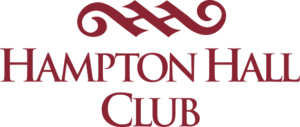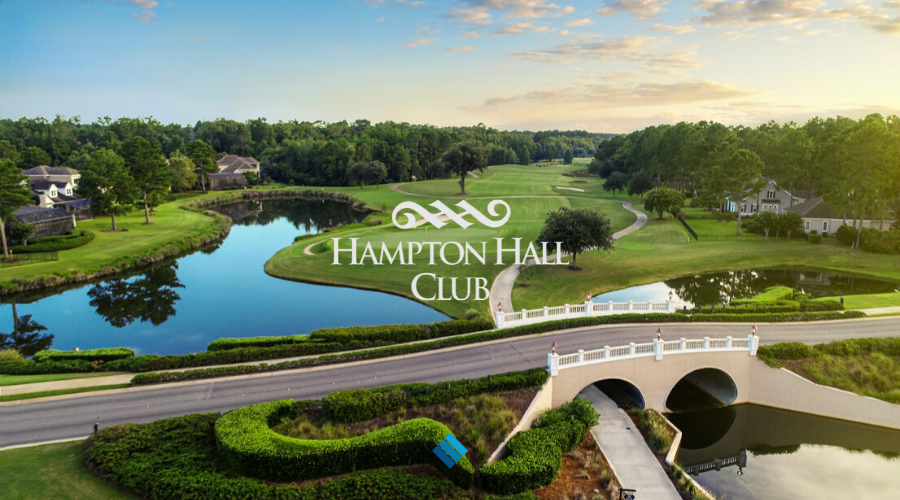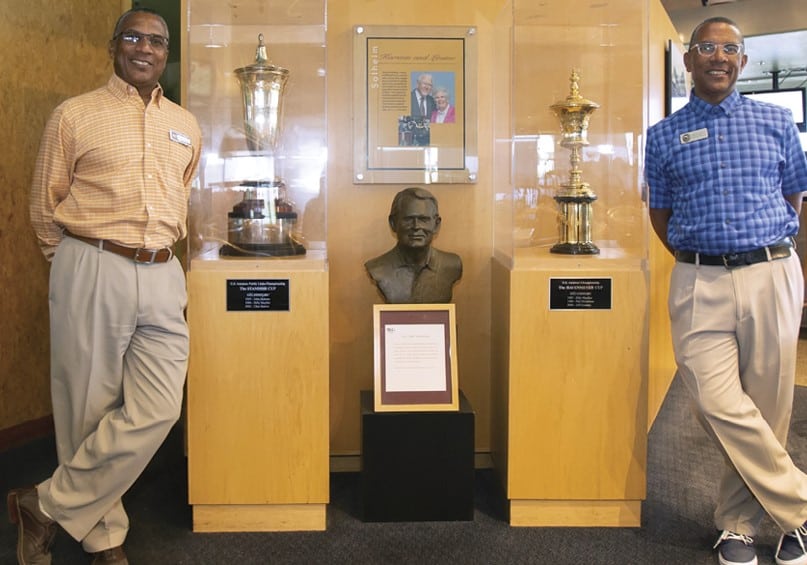
ASSISTANT GENERAL MANAGER
HAMPTON HALL CLUB
Bluffton, SC
The Club:
Located in the heart of Bluffton, SC, the Club at Hampton Hall Club and Community is much more than a collection of amenities. The Club experience is focused on bringing people together – friends, family, members and guests – and it’s designed to evolve and adapt to the membership’s wants and needs. No one element exists on its own: the golf blends seamlessly with dining and the same is true for the tennis and pickleball program and the fitness center. Each piece relies on the other, and they all come together to form what the community calls the Total Experience. One that can be shared with the whole family and is the source of cherished memories again and again.
Hampton Hall Club and Community is a lifestyle community with 944 private residences. The stunningly unspoiled natural beauty of Hampton Hall’s private links-style golf course from legendary architect, Pete Dye, is a thrill to behold – in the early morning or late afternoon, from the tee box, the fairway, or simply walking through the neighborhood. A comprehensive golf practice facility allows members to work on their game before they play and the full menu and bar at Pete’s Grill gives them a place to celebrate after.
Members hit the courts to enjoy a variety of racket sports including tennis and pickleball. The tennis program is designed to appeal to newcomers and seasoned players alike, the friendly head professional focuses on not only improving members’ game but helps them learn to enjoy it more as well. A full calendar of clinics, mixers, and socials provides ample opportunities to meet new players and make new friends. The bocce and basketball courts are accompanied by a children’s playground to accommodate the large family demographic in the community.
Every amenity is designed for the entire family to enjoy, especially the Club’s lakeside zero-entry pool – a year-round resort-style poolside vacation where families, children, and grandchildren swim, play, and dine at the Splash Café in the summer. Plans are in place to expand all of these amenities for the future.
Conveniently located next to the swim and tennis complex, Hampton Hall’s state-of-the-art, full-service fitness center offers everything members need to live well. Whether they prefer swimming laps or lifting weights, they enjoy a quality workout in a clean, friendly facility staffed by experienced sports trainers and fitness instructors. Spa and massage rooms offer a full array of facials and massages by appointment. The 14,000 square foot fitness center offers a full-line of exercise equipment, personal training, fitness instruction, and a variety of daily group fitness classes. Within the facility is featured a 25-meter indoor pool for laps, swim lessons, water aerobics, and free swim.
At the heart of the community is the beloved Clubhouse, a 24,000 square foot gathering place where members meet up with friends, play cards and mah-jong, host a community club meeting, plan an event, or simply pass the time together. The Club offers multiple dining rooms for every family or friend-filled gathering, from the formal Brasserie dining room, with vaulted ceilings and intricate wood detail, to a cozy spot in the Tavern Bar or Library room for a more casual atmosphere. The Club also boasts one of the largest ballrooms in the area for significant life or member events. Indoors, outdoors, big or small, whatever in the need, all are welcome at the Community Clubhouse.
Once you exit the gates of the Community, there is adventure that stretches out in every direction of Bluffton: shops and festivals, a stroll down Old Town Bluffton for eclectic shops and galleries, or excursions on the river and historic tours to see where yesterday meets tomorrow. Hilton Head beaches are a bridge away.
Hampton Hall Club Overview
- 944 Members (Golf: 300)
- Initiation Fee (Resident Member $6,000, Golf $5,000)
- Annual Dues (Resident Member $4,383, Golf $5,440)
- $7.50M Gross Volume
- $3.90M Annual Dues
- $1.27M Annual Golf Dues
- $1.0M F&B Volume
- $2.44M Gross Payroll
- 78 Employees
- 7 Board Members
- Average age of members is 65
The Assistant General Manager Position:
The Assistant General Manager is ultimately responsible for all clubhouse, food and beverage, fitness, aquatics, tennis, and facilities operations daily, including the general housekeeping over these areas. The Assistant General Manager is responsible for all aspects of the operation in the absence of the General Manager and performs specific tasks as requested.
This managerial position works closely with, and reports directly to, the General Manager/COO, and provides quality leadership and contributes to the positive atmosphere of the Club and associated operations. He/she will also prepare annual department budgets in concert with the GM/COO.
The AGM will enhance the “club culture” and is responsible for the dissemination of hospitality, friendliness, and goodwill among members, guests and staff. His/her goal is always to help members and guests enjoy the facilities, recreation amenities, and events of the Club. In addition to building relationships with Club members, guests, and employees, he or she provides support to the respective committees and advisory groups as well. Being the “public face” of these operations with a hands-on approach and an understanding that full member and staff engagement is critical to success in this position.
The AGM consistently provides anticipatory hospitality along with superb dining and other food and beverage experiences for the Club’s membership and their guests. Alignment with the Executive Chef is very important to this position to ensure collaborative, innovative, harmonious relationships between front and back of house operations.
Primary Responsibilities
Member Services:
- Consistent sincere and significant engagement of members, highly visible to members and staff in the dining areas of the club is of premium importance. The AGM is ultimately responsible to ensure that all member dining and club events are well-conceived and executed along with all amenities.
- Provide quality leadership in a positive and upbeat manner for the members, guests and staff.
- Create and maintain a first-class service culture throughout the club property and its amenities.
- Address and resolve all member and guest complaints and suggestions, general service, employee attitude, maintenance, and presentation of the clubhouse operations.
Employee Relations:
- Oversee the recruiting, hiring and development of clubhouse and recreational amenity personnel.
- Oversee ongoing training programs complete with up-to-date training manuals to ensure exceptional service in all parts of the club’s operation.
- Provides for training and future development of all subordinate managers and supervisors subject to budget approval by the General Manager/COO. Instill the concept of being “team players” in all employees. Continue to coach, counsel, and evaluate departmental staff.
- Ensures that a positive spirit and healthy work environment exists throughout the club operations, one that is free of safety risks and all forms of employee harassment.
- Maintain an effective communication program where employees are treated in a fair, structured and consistent manner.
- Function as an administrative and communication link between departments in the club.
- Guarantee that all clubhouse employees are regularly trained and certified in areas that help guard the safety and well-being of our members, guests and other employees including, but not limited to responsible alcohol service, safe food handling, etc.
- Help to facilitate a team environment with morale, high ethical standards and efficient use of resources to position Hampton Hall Club to be a preferred employer of choice in the community.
Financial Management:
- Works jointly with the Controller and General Manager/COO to prepare the annual operating and capital budgets for all clubhouse and recreational operations, assists in managing and controlling the operations to attain the desired results.
- Monitors the budget each week/month and directs the taking of corrective action as necessary to assure that the budgeted goals are attained.
- Provides input to all clubhouse and recreation personnel regarding annual budgets, capital spending plans, fiscal controls and operational guidelines.
- Responsible for all labor cost payouts and maintains them within the constraints of the budget and through close coordination and with approval from the General Manager/COO and Controller.
- Monitors payroll records to control overtime and maintain labor costs within budgetary guidelines.
- Supervises the purchasing, receiving, safekeeping and disbursement of operating supplies and equipment to maximize quality and profitability.
Personnel Management:
- Displays very hands-on approach and leads the staff by example. Must be approachable to staff, members and guests.
- Assists the General Manager/COO in developing and implementing long-range (strategic) and annual (business) plans, operating reports, forecasts and budgets.
- Works with Human Resources to develop long term staffing needs for area of responsibility.
- Responsible for the hiring, discipline, termination and documentation of all clubhouse and recreation staff.
- Reviews all accidents, works with HR and Safety Committees in completing accidents reports and implementing improved procedures.
- Attends meetings of senior management and carries out directives because of these meetings and any other requests of the General Manager in a timely manner.
- Serves as an ad-hoc member of appropriate club committees and advisory groups.
- A warm personality, a sense of humor and the ability to work effectively with all levels of the internal staff and members.
- Works with Executive Chef and Food and Beverage Team to develop P&L statements prior to each event, makes appropriate notes following events and files information for future use.
- Works with Executive Chef on menu development.
- Works with the F&B Team to organize and market special club events with guidance of the Social Advisory Group.
- Furthers his/her own continued development as a club management professional as a member of CMAA. With the assistance and approval of the General Manager/COO participates in appropriate seminars/training programs, thereby enhancing his/her value and quality of services to Hampton Hall Club.
Operational Responsibilities:
- Understands and abides by Hampton Hall Club policies and departmental procedures. Suggests changes and may direct the implementation of change.
- Provides content for and manages communications and marketing materials for department.
- Assures that the Clubhouse operations and Recreational amenities are run in accordance with all applicable local, state and federal laws.
- Ensures that the club’s preventive maintenance and energy management programs are on schedule and in use.
- Disseminates information effectively and coordinates activities between departments on a timely basis.
- Keeps the General Manager/COO informed of all potential problems and activities related to the smooth operation of the clubhouse and recreation amenities.
- Oversees inventory management throughout departments and completes a periodic china, glass and silver inventory to maintain par levels.
- Coordinates and approves all entertainment in consultation with the Food and Beverage Team and others.
- A sharp eye for detail in the overall management of the operation.
- Responsible for regularly reporting of performance and financial data, i.e. weekly report to General Manager/COO.
Direct Reports
Executive Chef, Food and Beverage Team, Dining Services Manager, Social and Events Director, Director of Facilities and Common Grounds, Sports and Recreation Director, Tennis Professional, Housekeeping.
Candidate Qualifications:
- A minimum of 5 years of progressive leadership and management experience in a private club environment.
- A Bachelor’s Degree from an accredited college or university, preferably in Hospitality Management or Business.
- Certified Club Manager (CCM) or in active pursuit of designation preferred.
Note: A pre-employment drug screen and background check will be required. The position is available January 18, 2021.
Salary & Benefits:
Salary is open and commensurate with qualifications and experience. The Club offers an excellent bonus and benefit package including CMAA membership and continuing education.
Inquiries:
IMPORTANT: Interested candidates should submit résumés along with a detailed cover letter which addresses the qualifications and describes your alignment/experience with the prescribed position by Friday, February 5, 2021.
Documents must be saved and emailed in Word or PDF format (save as “Last Name, First Name, Hampton Hall AGM Cover Letter” and “Last Name, First Name, Hampton Hall AGM Resume”) respectively to: execsearch@ggapartners.com. Please email résumé with references.
For more information about Hampton Hall Club, please visit hamptonhallclubsc.com.













